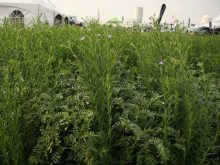Glacier FarmMedia – Recommendations were made more than two years ago on how to simplify and streamline Canada’s Advance Payments Program, and Agriculture Canada recently updated its progress on enacting them.
In June 2023, a review of the Agricultural Marketing Programs Act, which regulates the APP under the guidance of Agriculture Canada, was tabled before Parliament. The APP program is meant to provide relatively low-cost cash advances for farmers, but the review noted four farmer-facing changes that could improve the system.
Why it Matters: APP, particularly the interest-free portion of the lending program, has been the subject of back-and-forth between farmers and the federal government in recent years.
Read Also

Accurate accounting, inventory records are important
Maintaining detailed accounting and inventory records is not just a best practice; it’s a critical component of financial health, operational efficiency and compliance with programs like AgriStability.
To date, only one has been tested as policy.
Create a more risk-based approach to credit-worthiness
This suggestion is being piloted for the current APP program year (April 2025 to March 2026). The new structure of the program puts more weight on repayment history. Producers with a good track record under the program can receive advance issuance more quickly, an Agriculture Canada spokesperson said in an email.
In the process, it will allow administrators to dedicate more time and effort to applicants struggling to repay their loans.
“The new credit-worthiness provisions will save time and resources for APP administrators and low-risk applicants without increasing risk,” the spokesperson said.
“(The change) was a result of us for seven years pushing on the department that we need to streamline the credit-worthiness for customers who are not a credit risk to the program,” said Dave Gallant, vice-president, finance and APP operations, with the Canadian Canola Growers Association, which is the largest APP administrator.
“Essentially, a farmer who’s been with the program for four of the last seven years who has not defaulted in the last four years, that used to be five years, we don’t have to do a credit score on.”
Streamline APP limit changes
Agriculture Canada said this recommendation would make for easier adjustment if the interest-free limits of the APP are increased in times of crisis, as they have been repeatedly in the last five years, most recently in the case of canola advances, as well as an earlier increase for APP applications in general, following pressure from farm groups.
If implemented, it would require Agriculture Canada to notify producers and APP administrators of the change early enough for preparations to be put in place, said Gallant.
He said the recommendation is based on recent cases where the department set its interest-free limits after the APP year had already started, causing headaches for both administrators and producers.
“Administrators … are often the last or second-to-last group of people to know that the changes are coming, and so (Agriculture Canada) has tried to — or is trying to — put process in place that would allow us as administrators to have a heads-up earlier,” Gallant said.
Reduce need for priority agreements
Agriculture Canada currently requires APP applicants to have priority agreements signed by any other creditors, using the advance commodity as security.
“The creditor must agree to give the APP program administrator first priority for payment when the commodity is sold,” wrote the department spokesperson.
“Obtaining these signed agreements can be burdensome for the producer and, without them, the producer is not eligible for an advance.”
However, under the recommendation, priority agreements would no longer be required in most cases. Instead, program administrators would register liens with the applicable provincial property registrar at the time of advance.
“Doing so would notify all other creditors that the producer has an APP advance and identify the commodity used as security. APP would no longer always need first priority on the proceeds of sale,” the spokesperson said.
Apply a risk-based audit for proof of sale
Under current legislation, loan recipients must provide proof of every sale of the commodity used as collateral on the APP loan.
With a risk-based audit approach, producers would only be required to provide proof of sale documentation at the request of APP administrators, the spokesperson said, meaning producers would only occasionally be required to submit these documents.
















